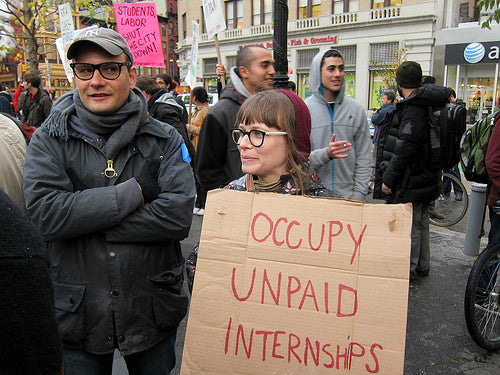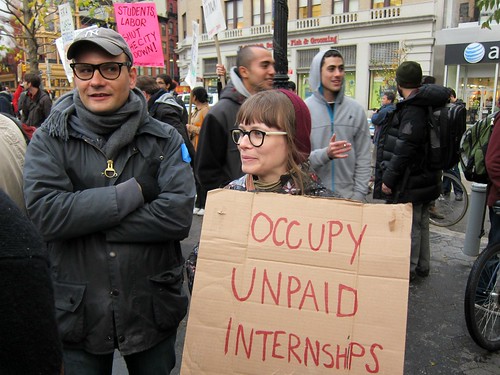Ross Perlin in New York Times Room for Debate: "Not Your Father's Internships"

The stories about internships are well known by now: highly coveted positions auctioned off to the highest bidder; long hours and overtime work rewarded with little to no remuneration; barely anything in the way of training or education; and, to top it all off, no real guarantee of future employment or the proverbial foot in the door. While most of this has already become the object of common knowledge and is typically accepted with a blasé shrug by millions of students and recent grads, the normalization of exploitative and illegal labor practices in today's internships are finally beginning to receive serious challenge and wider coverage in the public eye.
In Sunday's New York Times Room for Debate discussion, Ross Perlin, whose acclaimed Intern Nation comes out in paperback this spring, clearly lays out for a wider audience the largely disavowed yet nonetheless brutal damage internships have been wreaking for years among younger generations. He writes:
The damage is everywhere. Youth unemployment hovers above 18 percent, near an all-time high. The entry-level job is fast becoming an endangered species. A whole generation of twentysomethings feels adrift - crushed by debt, living with their parents, delaying traditional milestones of adulthood, unable to become independent stakeholders in society. Meanwhile, the labor of unpaid interns has quietly replaced or displaced untold thousands of workers. Lucrative and influential professions - politics, media and entertainment, to name a few - now virtually require a period of unpaid work, effectively barring young people from less privileged backgrounds. There are even broader effects of the internship boom: constricted social and professional mobility, growing inequality, and an economy whose top tier is becoming less and less diverse. Even more seriously, a fundamental ethic in American life is under threat: the idea that a hard day's work demands a fair wage.
With recent high-profile class action lawsuits filed by former interns, growing frustration at what feels like perpetual job precarity, and Occupy protest movements taking note, many are calling for some form of government involvement and collective action to offer a meaningful response to the legally questionable and morally dubious arrangements that have happily sustained this ongoing exploitation of millions under the auspices of "mutually beneficial" and "valuable" work experience. Perlin concludes his post by invoking the government's fundamental responsibility to legally enforce its labor laws and ensure that the "labor market remains a level playing field."
Not just an expose into the seamy underbelly of this world, Intern Nation is a pioneering work and it has already been hailed as a landmark investigation calling for serious legal and political reform to put a stop to the vast catalogue of labor abuses and illegal exploitation that has unfortunately been allowed to remain the norm for most internship experiences.
Visit the New York Times Room For Debate to read the post and the responses to it in full.
